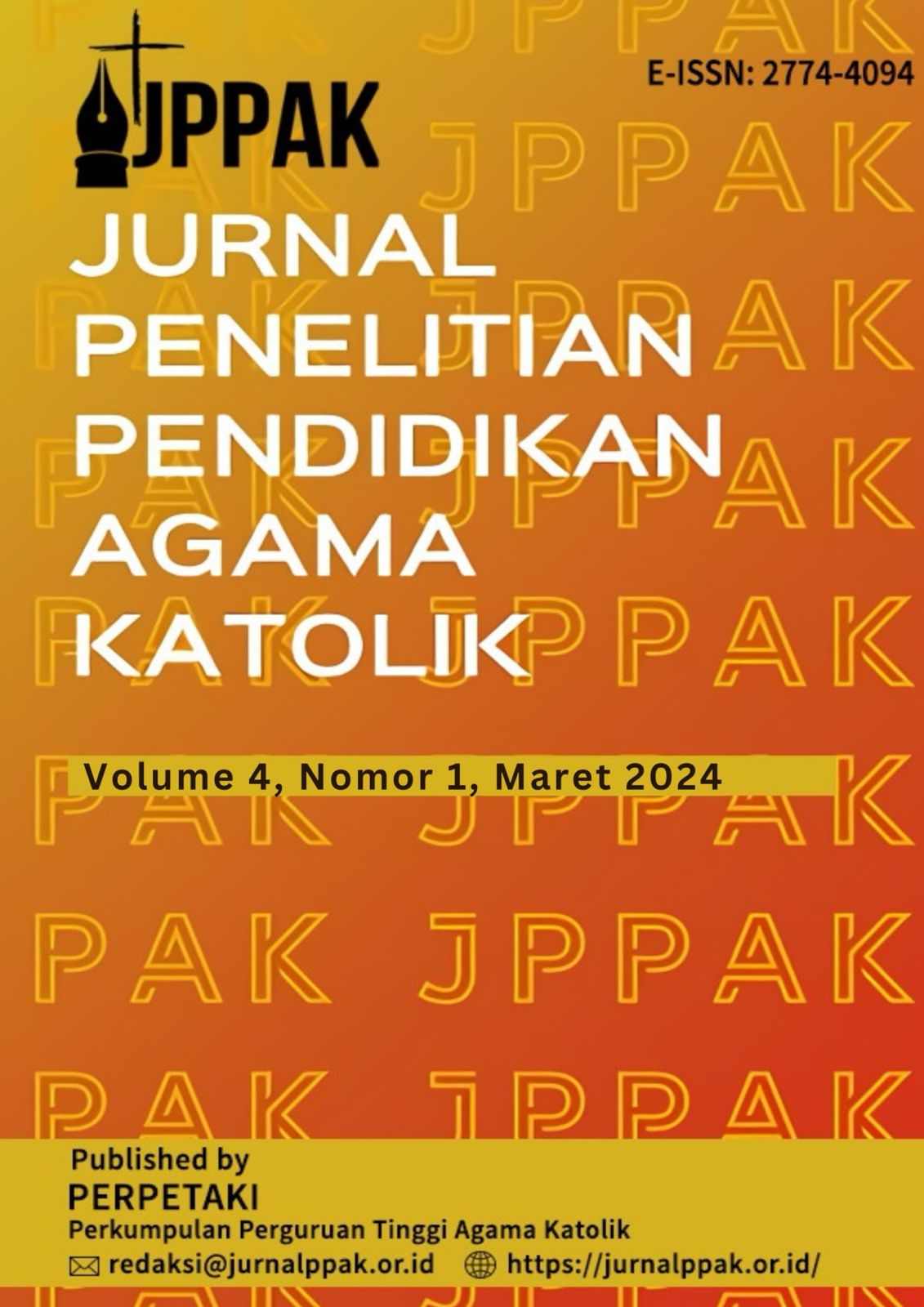Katekese Umat Kontekstual: Sebuah Upaya Penyembuhan Luka Batin untuk Meningkatkan Ketenteraman Umat
DOI:
https://doi.org/10.52110/jppak.v4i1.118Keywords:
Healing inner wounds, catechesis for people, recollection gathering, forgivenessAbstract
The utilization of retreats for emotional healing is a form of
catechesis that can aid in the spiritual development of Christians.
Traditional catechesis methods, such as lectures and deepening
of faith, have not yielded the desired outcomes in the Semarang
Archdiocese region. These methods primarily focus on cognitive
and kerygmatic aspects, neglecting to effectively address
emotional and behavioral achievements in Diakonia, koinonia,
and inter-faith dialogue. This research aims to develop a model of
catechesis utilizing the retreat method for emotional healing and
to identify the factors contributing to its success or failure. The
Research and Development method is utilized in this study, with
the analysis of 100 subjects. The findings suggest that in order to
optimize the implementation of Christian values, there must be
improvements in both the internal quality (such as closeness to
God, willingness to participate in retreats for emotional healing,
deepening of theological knowledge, emotional intelligence,
effective communication skills, and self-control) and external
quality (the closeness of the retreat participant's relationship with
God and the readiness of the student to learn) of catechists.
Downloads
##submission.downloads##
Submitted
Accepted
Published
How to Cite
Issue
Section
License
Copyright (c) 2024 Gregorius Daru Wijoyoko, Ambrosius Heri Krismawanto, Santoso

This work is licensed under a Creative Commons Attribution-ShareAlike 4.0 International License.
Copyright Notice and Permissions
Jurnal Penelitian Pendidikan Agama Katolik offers immediate open access to all its content on the principle to make researches freely available to the public, especially to the scholars, to support greater global exchanges of knowledge. This journal encourages all scholarly authors to allow their research openly available, free access and without time restrictions.
All articles published Open Access will be immediately and permanently free for everyone to read and download. Under the CC BY-SA 4.0 license, authors retain ownership of the copyright for their article, however authors grant others permission to use the content of publications in Jurnal Penelitian Pendidikan Agama Katolik (JPPAK) in whole or in part provided that the original work is properly cited. Users (redistributors) of Jurnal Penelitian Pendidikan Agama Katolik (JPPAK) are required to cite the original source by including at least: the full title of the article, the author's or authors' full name(s), JPPAK as the initial source of publication, year of publication and volume number using a propriate citing method.
Copyright encompasses exclusive rights to reproduce and deliver the article in all form and media, including reprints, photographs, microfilms and any other similar reproductions, as well as translations. The reproduction of any part of this journal, its storage in databases and its transmission by any form or media, such as electronic, electrostatic and mechanical copies, photocopies, recordings, magnetic media is prohibited without consent of Jurnal Penelitian Pendidikan Agama Katolik (JPPAK).
Jurnal Penelitian Pendidikan Agama Katolik (JPPAK) is licensed under a Creative Commons Attribution Share-Alike 4.0 International. (CC BY-SA 4.0)
Authors who publish with Jurnal Penelitian Pendidikan Agama Katolik (JPPAK) agree to the following terms:
- Authors retain copyright and grant the journal right of first publication with the work simultaneously licensed under a Creative Commons Attribution Share-Alike 4.0 International (CC BY-SA 4.0) license that allows others to share the work with an acknowledgement of the work's authorship and initial publication in this journal.
- Authors are able to enter into separate, additional contractual arrangements for the non-exclusive distribution of the journal's published version of the work (e.g., post it to an institutional repository or publish it in a book), with an acknowledgement of its initial publication in this journal.
- Authors are permitted and encouraged to post their work online (e.g., in institutional repositories or on their website) after the publication on JPPAK, as long as it not published on other OJS for it will be treated as plagiarism by plagiarism checker apps. It can lead to productive exchanges, as well as earlier and greater citation of published work (See The Effect of Open Access).












